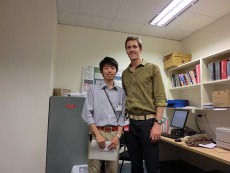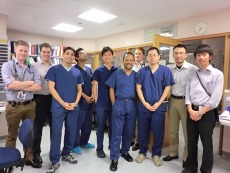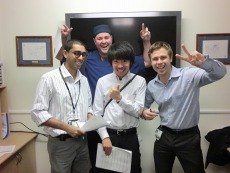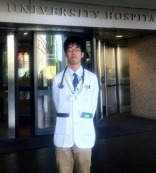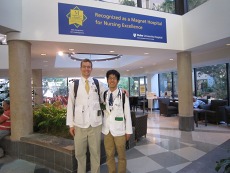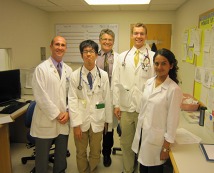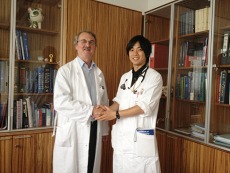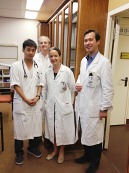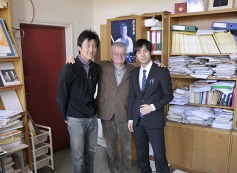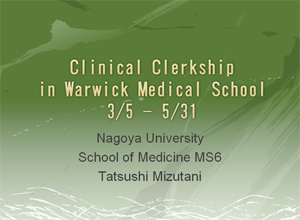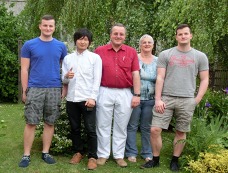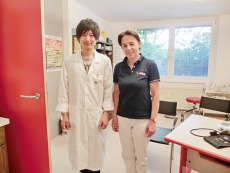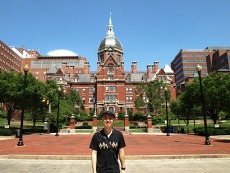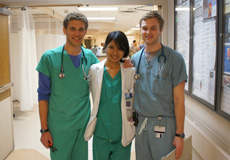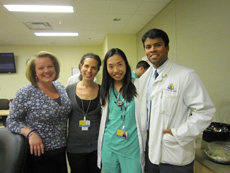Experience Reports (for Nagoya University Students) | 2012
Royal Adelaide Hospital
Tomohiro Ishikawa
I had a chance to visit Royal Adelaide Hospital in Australia and studied at Trauma Service, Cardiothoracic Surgery, and Urology. I could spend a great time there because I found a lot of differences between Japan and Australia and there were many opportunities to help doctors to treat patients.
I rotated Trauma Service in the first month. I was attached to the doctor on duty every day and observed how Trauma Team works. More than 10 medical staffs came in and started working quickly in a resuscitation room, soon after a patient who had been seriously injured was carried into the room. At first, such a scene was amazing to me. What I worried about at first was listening to and speaking English. However, I was getting used to communicate with doctors and nurses day by day and sometimes could feel I was one of the Trauma Team members when a shortage of staff occurred. Although there were many patients who were injured in traffic accidents and mechanical falls, patients who were stabbed with knife or shot with gun sometimes came to the resuscitation room, too. I also observed Trauma Surgery for them. To see those patients was really stimulating to me.
In Cardiothoracic Surgery I rotated in the second month, although medical students are basically attached to Intern and study about works at words, I followed not only Interns but also doctors who take consults. Therefore, I could understand how patients are hospitalized, treated, and discharged. Interns sometimes gave me chances to take blood. I asked Interns to give more jobs to talk with patients and could get some more jobs. Operations are mainly Heart Valve Surgery and CABG. I was really surprised that the operating time was quite short (3-4 hours) because I had heard that Heart Surgery takes a long time in Japan. There are two Japanese doctors in this unit and they took care of me very much and told me the characters of Cardiothoracic Surgery and patients in Australia. I attended grand round with cardiologists once a week and got a chance to present about ‘takotsubo cardio myopathy'. Although I felt nervous because that was the first experience for me, I was glad to be praised by doctors after presentation.
The rotation of the third month was done at Urology and I mainly observed outpatient clinic and operations. They treat various patients except pediatric urology and I could learn many cases. My boss kindly taught me about diagnosis and treatment and gave me the opportunity to do cystoscopy. There was a multidisciplinary team meeting once a week and I learned how to allocate difficult cases to surgery, chemotherapy, or radiotherapy.
During my stay in Australia, I got to know the differences of the society of medical doctors, health care system, and lives of people between Japan and Australia. It was very hard for me to grasp the statuses of patients because the term of hospital admission is usually quite short and many operations are performed every day, but I'm sure that experience was good for me. This opportunity also helped me think about what I want to do in the future.
I had to start my life in Australia with little advance information because I was the first visiting student to Australia. However, I met Japanese doctors who work at hospital or as researchers and they gave me very helpful advice. In hospital, all of the doctors and nurses are very kind to me and I enjoyed these clinical electives so much.
Lastly, I really appreciate all the people who gave such a wonderful opportunity to me; Dr. Kasuya and all the staff of the International Affair Office of Nagoya University, Dr. Patrick and all the staff who works at Royal Adelaide Hospital. Thank you very much.
My challenge in Duke University
Tatsuya Ito
I studied in Duke University located at Durham NC in USA for 3 months. Durham is a very good city because people can enjoy a rich nature including much trees, birds and squirrels there. I had a wonderful and hard 3 months in Duke University. Precisely, I am not a returnee student. And I am not good at English. But my honored teacher motivated me to study abroad. Dr.Hasegawa, a professor in pulmonary medicine in Nagoya University, told me that experiencing the world standard is very important and it will become your asset. Afterwards, I challenged to study in Duke University with a big interest and anxiety. For 3 months in Duke, I experienced the USA-style clerkship in pulmonary medicine, Neurology, Neuroradiology, Cardiology with students in Duke or exchange students from many countries. In USA, we can participate in very unique clerkship that is different from Japanese clerkship. But it means we have to try many work which we have never experienced. It was hard work for me. I think all medical staffs regard American medical student as a kind of medical doctor though students don't have medical license. This means patients and staffs trust medical students as a doctor and we students have to be responsible for our work. So almost all doctors warned us medical students to be aware that we are REAL doctors when we don't try to improve ourselves or we are not very familiar with our patients. Through such a clerkship, I could obtain the essential sense to be a doctor. Anyway, I really enjoyed the clerkship in Duke. In every morning, our team starts morning rounding around 7am. Before this rounding, we students have to check our patients and report problems and plan to our Attending doctor. During the rounding many patients in other service are consulted. Students in the team go to the consulted patient first. We students check the medical record and ask the situation of the patient and do a physical examination. After checking the patient, we make differential diagnosis and plan for the patient. We have to check up this patient for about 1 week. I really enjoyed this clerkship because we don't have the chance to assess my patient totally in Japan. In USA, we have a right and responsibility to check the patient totally. I think this is good point in medical school in USA. When we suggest the plan or treatment, we have to show clear evidence by introducing related papers. I used to check related papers and feel no border between the clinical medicine and research. Lung transplantation is very famous treatment in Duke pulmonary medicine. Patient with sarcoidosis, lung fibrosis and cysitic fibrosis(very rare disease in Japan) undergo the lung transplantation. I checked the patients who underwent the transplantation and I was surprised at the dramatic improvement of their lung. Dr.Tapson, my attending doctor in pulmonary medicine, is a specialist for pulmonary hypertension. He always taught me how we can make a relationship between the clinical medicine and research. I could experience many challenges other than clerkship. In this time I had first experience to live in foreign country. During this stay I had a chance to think about Japanese and US medical situation and culture. So I can evaluate Japanese medical system objectively. And there are many good Duke students and exchange student from many countries in Duke University. I could learn a lot with them and I want to have a chance to work with them in the future. I have to improve myself to have a good time with them. In weekend, my attending doctor invited me a wonderful party and so on. I could communicate with leading doctor in various fields and learn many career-pass as a doctor. Through this experience in Duke I can learn how to improve myself and how to enjoy my improvement. I had many difficulties to communicate in English but there are many friends and doctors around me. I really appreciate those who support for my challenge. I also want to support many students who will study in foreign countries. Thank you.
Experience of study abroad - Gdański Uniwersytet Medyczny / Medizinische Universtät Wien
Kensuke Kato
I went to Gdańsk in Poland and Vienna in Austria through the exchange program. All the experience I had was really thrilling and precious because it was the first time for me to stay in foreign countries, initially I felt a little bit worried, though. My schedule of this clinical clerkship was 3weeks for Neurochirurgii in Gdańsk, 4 weeks for Notfall and 4 weeks in Neurochirurgie in Vienna. Poland is a former communist country and now it's on the road to capitalism. It's economically developing in a rapid pace, and the hospital where I learned is very new, beautiful and well equipped. All the equipments are most advanced ones. Unfortunately I could not understand the Polish-language-conference and round, but I could attend many surgeries as an assistant. I was allowed to do skin suture, too, because I was really eager to learn and I knew how to do it. Polish people are known as pro-Japanese because of their original character and the historical reasons. Professor Wozniak, who is a supervisor of the exchange program between Nagoya university and Gdansk medical university, loves Japan as well and he treated me so gently. The old town, which reflects the shadow of former communist, is extremely beautiful. Besides, food is so good and cheap as well. I regret the shortness of my only 3week-stay there. Vienna, as known as the capital of music, has a similar scale of population and area as Nagoya and is popular for sightseeing. The hospital where I learned is called AKH (Allgemeines krankenhaus der stadt Wien). It has a huge number of 2,245 beds and is 2nd biggest hospital in the world (1st biggest in the Europe). It's also famous for its concentrated advanced medical care and its transport systems to cover its hugeness.
The department of emergency medicine is divided into Notfall (emergency internal medicine) and Unfall (trauma care unit). Notfall provides internal medical care for emergency, except trauma. It also has a heliport and many severe patients are transferred out of Vienna. They are busy after the evening when all the outpatient offices and clinics are closed, which is same as Japan, but the difference is that a doctor rides in the ambulance and they can give diagnosis before coming back to AKH. This helps them with providing more detail information and direction of treatment in advance, so that they can prepare everything needed before the patient arriving.
The department of Neurochirurgie (Neurosurgery) is in another ward next to AKH main ward. It is a leading neurosurgery famous for professor Knosp, who made “Knosp classification” for pituitary tumor using MRI. There are also some exchange doctors from Taiwan, Ukraine and so on besides me. The neurosurgery in Vienna, the origin of the neurosurgery of Nagoya University (i.e. the origin of neurosurgery in Japan), is so active neurosurgery department, having 3 operation rooms, 1 room for DBS and 1 room for angiography.
The training in Vienna required me activeness and positiveness. Unlike ERASMS, there is no fixed program for students from Nagoya University. When I asked how I could learn something there, Professor's reply was “It's all up to you.” I followed the conference and round, but I couldn't understand German and I felt being at a loss. In order to learn something, I had to make acts voluntary. I asked doctors many times to give me explanations, but some doctors looked really annoyed with me and I felt shocked, but I didn't give up asking questions. Due to these efforts, they admitted me gradually and got friendly to me. My attitude such as studying German during rest time of training seemed to make them feel intimate to me. In the neurosurgery department, I went to operation room every day after finishing the duty of taking blood and putting iv in the morning round. Every day I observed all the operations, from the beginning to the end, helping them with everything I could. Every time I asked operator some questions. Then associate professor Bavinzski, who is a No.1 of cerebrovascular surgery in Neurosurgery of Vienna, allowed me to do 1st assistance of his surgeries in last 10 days. It was for the first time for me to do assistance under the microscope. He taught me many surgical techniques and invited me to the skill-up-seminar for the cerebrovascular surgery which many neurosurgeons come from around Europe. Professor Bavinzski said, “Operation is same as music. An operator is a conductor. All the small details have meaning. A conductor gives every instruments detail direction, and all the small things make up the whole music. Don't see the operation vaguely. Watch all the detail of the surgery.” This is my most important discipline I learned in Vienna.
Through this exchange program, I learned two things. First, I learned how interesting it is to communicate with people of different culture, using second language. English gave me so many friends. I appreciated the international communication. 2nd thing that I learned is, if you continue to pursue your goal with positive attitude and maximum effort, you must be able to make the difference. Aggressiveness makes chances. This experience makes me more confident.
In the end, I would like to express my sincere appreciation to all the professors (especially to Professor Knosp and Professor Wozniak), attending doctors, friends and exchange program coordinators at Medizinische Universtät Wien and Gdański Uniwersytet Medyczny. I would also like to express my gratitude to Professor Wakabayashi, Dr.Ito, Dr.Sakamoto, Dr.Kasuya, and all the staff of ofiice of International Affairs at Nagoya University School of Medicine. Thank you.
Clinical Clerkship in Warwick Medical School
Tatsushi Mizutani
Vienna Medical University Exchange Report
Naohito Sai
I went abroad to study at Vienna Medical University for about three months through exchange program this year. I applied for this program because I had interested in medicine in foreign countries, not because I would like to get some chance to work in foreign countries in future. But I believed I would have valuable experience that I couldn’t have in Japan in ordinary. I rotated three department; Emergency Department for three week, General Practitioner Program for four weeks and Lung Surgery Department for four weeks. I remember that I felt so nervous on the first day because I don’t have confidence of my English. The boss in emergency room told me that all you can do is observation at ER, because you can’t speak German , and you have to speak English more fluently! After all, I can’t do any practice other than observation. Nevertheless, I study by myself and sometimes ask some doctors when I met some case at ER, so it was not so bad practice than I had expected on the first day.
Next, I practice in GP which means general practitioner and we can study home medicine there. In the United States, Europe and some Asian nations, there are home doctors. Therefore, people who want to become home doctors have to study there for several years. It is close to General medicine in Japan. I would like to become a doctor who can see many various kinds of patients and offer holistic therapy. So I have a interest in general practitioner who plays a role of what is called Jack of all trades in medicine. In this department, we can practice at some home doctors’ office in the city of Vienna and see some medical facilities. In my case, I could see Homeless Care Center, HIV Care Center, Overtime Emergency Visiting Service, STD Prevention Center and Long-Term Care Health Facilities. The staff there told me that if you had interest in other medical facilities in Vienna, I would fix the schedule for you. On weekends, we can practice and stay at some home doctors’ office in rural area in Austria. The most impressive experience at GP is practice in rural area, I think. I could have various experience not only about medicine but about culture in Austria. I could see many kinds of cases; disease we can see mostly in rural area such as orthopedics problem accompany with farmwork and farmer’s lung , even obstetrics and pediatrics. Then, even on holiday, if some accidents happens, we had to head and see patients before ambulance reached the scene, and offered life supports for the patients, and I can support the doctor. In addition to that, I enjoyed some Austrian food the family made for me. I think I had so nice experience through this practice. These practice at GP is made out for our exchange students, so the doctors were so kind of us to teach us many things and try to take out our questions.
In the end, I practiced at Lung surgery department. I have interest in surgery. I would like to see transplant surgery that we can’t see in Japan easily. I couldn’t decide which department I should select Cardiovascular or Lung surgery, but finally, I decided to practice at Lung Surgery Department. In my daily schedule, I attended the conference at 7 am for one hour, then I drew patients’ blood or put patients on a drip at hospital ward, saw some operations or saw out patients. In this way, I could practice at Lung surgery Department as I hoped. I would like to see many cases on operations, so I saw two or three operations every day. As a result, I could see some lung transplant operations and even a heart transplat operation, thanks to a kind doctor’s support!
I could have these various experience thanks to everyone, especially Dr. Kasuya who is in charge of international exchange program, Miss Yamasaki, many staff in the educational affairs section, members of the Frontier organization, doctors who took care of me in Austria, many seniors who taught us many things before I started to study abroad, and classmates. I avail myself of this opportunity to renew to your excellency the assurance of my highest consideration.
Johns Hopkins University
Yuta Takahashi
My dream is to be a great Neurologist who conducts ground-breaking clinical trials and basic researches. The neurodegenerative diseases gradually progresses and the patients always have the fear of death. I want to contribute to development of treatment in Neurology field. I applied to this exchange student program so that I could make my career plan to achieve this goal. I wanted to learn good points and bad points of medical treatment and researches in the US.
I rotated Cardiology, Anesthesiology, and Allergy/Clinical immunology at Johns Hopkins University (JHU) and conducted a basic research about Alzheimer disease at Massachusetts General Hospital (MGH).
In cardiology department at JHU, I found a strong relationship between clinical trials and treatment. I had to show not only the guidelines made by AHA but also clinical trials which supported the guidelines when I presented a treatment plan for my patients. I was required to analyze the subjects in the clinical trial and decide if I could adopt the treatment plan showed in the clinical trials. I started medical interview and physical examination around 5 a.m. every day. Then, I searched research papers to make treatment plan for my patients. I usually discussed the plan with my boss around 7 a.m. It was a little tough job compared with clinical clerkship in Japan.
In Anesthesiology, I was attached to one of the residents in Anesthesiology, and I learned many things while helping them. In the operation room, I was allowed to do various medical procedures such as IV, A-line, intubation, and management of ventilation or blood pressure as students do in Japan. At first it was even difficult for me just to prepare proper medicine or equipments as residents told me since I couldn’t catch their words precisely. But gradually, I became to be able to support the operation well. In this way, I had so many precious experiences at this department. Moreover, it was so nice that I could observe many advanced operations in various fields.
In Allergy and clinical immunology, I interviewed patients who have various kinds of allergies. In the US, people can buy various medicines, some of which have a strong side effect, without a doctor’s prescription. I think that is why there are so many drug allergy patients in the US. During this rotation, I had a lot of chance to learn the various side effects of medicines. I felt that American doctors needed to have a deep knowledge of medicine which is not only in their field, but also in the other fields.
After three-month rotation at JHU, I conducted basic research about elongation of mice primary cortical neuron. I dissected natal mice cerebral cortexes, cultured them, and analyze the direction or speed of elongation of the dendrite. I worked with a Japanese researcher. He taught me not only basic skills for neuronal culture but also how Japanese researchers succeed in US.
In the US, since co medical staff is allowed to do many treatments without doctors’ permission, doctors are not as busy as doctors in Japan and they can concentrate on their research. This circumstance is very attractive for me. Much more patients are enrolled in clinical trials, and laboratories have a lot of money to buy new devices. I want to conduct researches in the US in the future..
Finally, thank you very much for letting me have a great experience as a medical student. I’m sure that the things I felt and learned will all be a great treasure of my life. I would like to say thank you to the doctors and officers of my university, JHU, MGH, my friends, family and all the people who supported me.
Duke University Exchange Report
Miyo Yoshino
I had a good opportunity to take part in the clinical clerkship at Duke University in the US for 3 months. It was a really sensational experience for me. I would like to report what kind of training I had there as a token of my gratitude.
I spend my rotation in the Rheumatology in the first month. I really had hard time at first because all of the languages spoken there was, of course, English, and I was not totally used to the new environment. However, I was always surprised to see the difference of medicine and culture between the US and Japan. I learned that students can be allowed to do the task which their attending thought they could do, and I tried to do my best to get the work as far as possible. Finally, I was allowed to see the patients in Duke clinic on my own. It was a really valuable experience for me, and I feel big gratitude for my boss, who let me see their patients.
My second rotation was Consultative Cardiology. I belonged to the consult team which consisted of an attending, a resident and three students. The training I went through there was very educative and stimulating. Students are required to propose some plans for the new patients after they see the patients. It was really tough for me, but I learned much from that experience. Moreover, we have to see the patients in CCU, MICU, SICU or ED, and I was particularly nervous when I see such patients. I felt the greatest happiness when my plan was accepted by our team.
The final rotation was Hematology/Oncology. It was the most concentrated month in terms of my physical strength and what I did. Heme/Onc rounds start at 6:30 am, so I had to get up at 4:30 am every morning to check if my patients did well overnight. In the morning round, we spend 30 minutes to see only one patient. In Japan, we usually spend at most 10 minutes to see one patient in the round, and I was amazed to know this difference. In the afternoon, I went to the bone mallow transplant center, VA hospital or cancer center, and had various types of works.
What was impressive for me was the attitude of doctors to educate their students as much as possible. Many doctors allowed me to take care of patients, assess each patient daily with examination and documentation of daily notes. They were generous to allow me to work as a team member. Furthermore, many doctors attempted to get the forefront evidence, and I realized I always have to learn after I start to work as a doctor and even after I get old enough.
Apart from the clinical clerkship, I had good time with many students from Taiwan or Sweden or Duke medical students. I really enjoyed talking with them about the difference about medical system, what we learned in the morning, and sometimes jokes.
I feel a great gratitude for all the people who helped me to have such a precious experience: Dr. Kasuya and all the staff of the International Affair Office of Nagoya University, my host family, people I met in Duke University and my classmates who worked together. Thank you very much.
Tulane University and Freiburg University
Sae Morita
I had a great opportunity to rotate in Tulane University, the United States, for 2 months and Freiburg University, Germany for 3 weeks through this program.
First, Tulane University has a long history since established first in 19 century, and obtain excellent reputation. It is located in New Orleans, very the south of the United States along the Mississippi River. The University hospital is located in its downtown includes the cultural sightseeing place called French Quarter, where every weekend we had some events or festivals. I also visited the main campus in uptown. To the contrary, it stands around the quiet in the just next to the beautiful park.
In April, the first month, I started my rotation in Emergency Medicine, ER. Students are supposed to work as if they were resident doctor in Japan, such as seeing patients by themselves, presenting them to the attending doctor. It was very surprising for me although I had heard about it beforehand and meant to be ready. I was confused with this difference about the duty they impose on students, and of course at first I couldn’t work as precisely as the Tulane students. However, every time I was on shift and work with physicians, they were so motivated to train students even if they were foreigners that they tried to provide many opportunities of my seeing patients and so on. I also worked so that could I reward their intension. As the day passed there, I realized I had been getting better at taking medical interviews , presenting patients, and giving an assessment, being supported greatly by the motivated physicians. The rotation in ER was very hard, to be honest, but at the same time, the rotation was so impressive to make me understand very different medical education between the United States and Japan.
I moved to the rotation in the department of Hematology/Oncology. I was positioned to the consult team composed of only 4 physicians and 1 more international student. In the morning, I did follow my patients, though usually not so many only one patient, and present the patient to fellow. Like every day we had a lecture or a conference in lunchtime, which was sometimes about their research, or One of the most impressive thing there is that I had the chance to learn about Sickle Cell disease. Just because of its location, there were many of patients afflicted with Sickle Cell Disease, which is rarely seen in Japan. I got to know many international physicians through the conference or the rotation overall in this department, such as Indian, Lebanese, Egyptian, Chinese, and so on. I was impressed, which also strengthened my motivation toward the residency in the United States. The attending and fellows working with me are also very nice and educated me very much. On the contrary to the rotation in ER, I learned to work in a team, communicating with them every day.
In the leisure time, I visited New York City and met with my classmates. It was so refreshing for me when I talked with my classmates about the rotation. I was very glad to know every of my classmates enjoyed working, while also having hard time like me. We are invited to Dr. Kanei’s home party and met with many physicians working there, which was also motivating.
The Third month, I moved to Freiburg University in Germany. Freiburg is very scenic city, located in South East close to the border of France. I was in the department of neurosurgery. This department has the own building of 7 floor and there are 5 operation rooms and 13 ICU beds only for the neurosurgery, which resulted in 15 operations approximately they perform a day!! I cannot speak German so I had only few chance to talk with patients directly but physicians, especially the resident doctor working with me were also very educative.
Half of resident doctors were female and also foreigner people from Greece, Turkey, and Chile. It reminded me of the fact that Germany have been one of the most advanced countries in medicine and many students and physicians especially around Europe can get together there to obtain the chance of learning the more advanced medicine. Besides, I, as a woman, was just amazed and happy to know there were so many female physicians working as a surgeon.
Last I appreciate all the people who associated with my studying abroad, worked with me and helped me, Dr. Ito, Dr. Sakamoto, Dr. Kasuya and all the staffs of the international affairs and student affairs, and the physicians and friends in the US and Germany. I hope very good luck on my junior students who goes abroad next year, and hope this program prosper even more. Thank you very much.
What I learned in Johns Hopkins University Hospital
Reina Tonegawa
With full of excitement, I arrived in Baltimore International airport on March 20th 2012. As I heard before, I saw more African Americans than white or asian people. This sight was totally different from what I had seen before… it was my first time standing on the South. People spoke with some southern accent, which was not familiar to me. “ I finally came!” I was very excited.
The town of Baltimore looked relatively small. I was skeptical about this town holding the best hospital in the US till I actually saw it. The dome of Johns Hopkins University Hospital stood in state. Cherry trees on both sides were in full blossom, just like welcoming my arrival.
First rotation was Emergency medicine. This area is advanced in the US and especially, Johns Hopkins is famous in Trauma Emergency. Gun shot wounds, stubbed, knocked…I was simply amazed to see the rare trauma cases. Also, I was surprised how much I could perform as a medical student. After examination of the patient and consultation to senior doctors, I was allowed to order primary tests such as labs or imaging and sometimes prescribe medicines. Doing these actual medical practices for the first time in my life, I was upset but truly felt that I was learning enormous things. As I worked harder, the more I was allowed to do. On the final day, I sutured a cut toe of a young man. Of course, I am going to do it thousands of times in next few years as a resident, but still, it was a great experience.
Next rotation was Pediatric Neurology, which was totally different from the first month. I actually wanted to take Adult neurology but there was no space available, then I took Pediatric instead. By the way, what is “Pediatric Neurology”? In Japan, it is a part of Pediatrics and Pediatricians take care of them. However, in the US, it is a part of Neurology department and taken care by Neurologists. Therefore, it seemed to be more specialized and senior doctors knew more and more about all kinds of pediatric neurological diseases. In this rotation, I saw various rare congenital diseases, which was for the first time and might become for the last time. As Johns Hopkins being one of greatest hospital in the US, rare patients gathered from all over the country and sometimes, from all over the world. They come and are discharged so quickly, therefore every 3 days, I met a new patient. During this rotation, I tried to read as many articles as possible and consulted with senior doctors. Attendings taught me very well as I study harder. Some patients were in NICU and it was very difficult to take care of them, but truly, it was a great moment to study and work in the team.
The last rotation was Medical Oncology, solid tumor team. Oncology is very unique in the US. Patients with all kinds of cancer come to Oncology department; therefore I could see not only scheduled chemotherapy patients but also many cancer patients with various medical emergencies, such as infective carditis, angina pectoralis, obstructive jaundice and so on. Compared with pediatrics, there were much more critical patients we had to take care of. Therefore, it was a pretty busy and challenging service for me. Working in this team, I could learn US style medical practice which put more emphasis on pathophysiology.
All in all, every experience I had in Johns Hopkins was wonderful. Knowing US style medicine, I know good and bad part of medical practice in Japan. Also, I could learn how it is important to catch up with newest information through reading English articles and also by performing various researches by ourselves. I will never forget the word by my attending, “What I am trying to teach is not the knowledge. Knowledge gets old so soon. What I am trying to tell you is the attitude that we try to update our information all the time.”
In last, I would like to thank Dr. Ito, Dr. Kasuya, Dr. Sakamoto, Dr. Sobue, Dr. Ozaki and all the great teachers who supported us for this clinical clerkship. Thank you very much.
Road to Poland(Gdansk)
Gota YOSHIDA
I studied abroad to Poland , Medical university of Gdansk, from 18/March to 14/July. I think most of Japanese people are not familiar with Gdansk. So, I want to introduce this city from the aspect of history and geography, following the informations taught by native Polish people.
Gdansk is the city faced on Baltic sea. Baltic sea looks dark and cold, but in summer it changes to beautiful beach. And many Polish people enjoy the sunshine or swimming in a short summer.
Gdansk and Gdynia(30km north to Gdansk) are nearly located in Polish cannel. And it was really important area for Poland and Germany at the age before WWII.Because Gdynia was only one port for Poland and it divided Germany into two parts. When WWII started Westerplatte which is the horn in Gdansk was attacked first.
After the WWII German are banished by Red army, because communism had a dominant power in Poland. And a huge ship yard was constructed, which supported the demand of Eastern countries.
I had a chance to study in this country from 18th March to 10th June.And I went to a laboratory of Prof. Wozniak , Trauma surgery and gynecology.
Medical university of Gdansk have English course and many Swedish, Great Britain, German students are studying. 40% of all students are foreign students.I had a communication with these students by English because they are bilingual or trilingual.
I will show you one example of the life of Gdansk in Trauma surgery.
We had a conference at 7:30 by Polish language.Sometimes a young doctor told me what this case is meaning.When I was visiting Poland only few patients are in the hospital because a new building was under construction.
From 9:00 a professor and doctors go around and they have operations in the afternoon normally.
In Polish medical system I found an interesting point.In Poland they have a system of insurance for the whole nation, same as Japan.
At the beginning of the year the government estimate how much operations would be necessary or how many patients would be in this year. And they calculate the cost of medicine from their prediction like a planned economy.
If hospitals have used too much in December and they have spend their money which are calculated at the beginning of the year, patients have to pay whole the cost of their medical expenses.
It often happens in December that the number of patients going to hospital and many beds get empty. Some students said their tasks are not so hard in the end of the year because of that reason.
In Europe if you become a doctor you can work any country in EU area. So, many doctors hope to work in Western countries, especially to United Kingdom.
Historically In UK many polish people immigrated and they have polish community.Some doctors go to work in the weekend by LCC to UK.
In Poland they also have many foreign doctors from Ukraine or Balkan peninsula countries. It was just a globalization but some people are worried about it because they lost their native doctors who are educated by their tax.
Most impressive thing was belief and religion. Polish are very religious catholic people.I often asked what kind of religion I belong to. And someone asked me “Do you believe the existence of spirit?”or” What do you think about the life after death?”. They were totally different from me because they are thinking about them when they are working in a hospital.
The life in Poland was very impressive and it became good memories for me. I felt some sympathy with Polish people even if we are living different country or believe different religion.
Thank you very much for the people supporting me, Prof.Sakamoto, Dr. Kasuya,Prof.Wozniak, Ms.Yamazaki and Ms. Nishio, and the doctors who went to Gdansk before.
